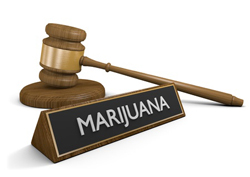 Photo Credit: David Carillet
Photo Credit: David Carillet
By: David Lutz, Manager BSA/AML
We’ve all come to the realization that the legalization of marijuana in the U.S. is something that is becoming more and more prevalent. As state legislatures and lawmakers have since softened their policies on marijuana usage (medicinal or recreational) and begun to see the monetary benefits of legalizing such at the state level, there still presents a heightened risk of money laundering in the banking industry. Being that marijuana is classified as a Schedule I controlled substance, it is still illegal under Federal Law.
- The drug or other substance has a high potential for abuse.
- The drug or other substance has no currently accepted medical treatment or use in the United States.
- There is a lack of safety for use of the drug or substance under medical supervision.
This label as a controlled substance is criminalized under Title 21 U.S.C. Section 841, which declares that “…it shall be unlawful for any person knowingly or intentionally -- (1) to manufacture, distribute, or dispense, or possess with intent to manufacture, distribute or dispense a controlled substance.” When this language from the Controlled Substances Act is combined with the language from the Money Laundering Control Act of 1986, specifically Title 18 U.S.C. Section 1856, the illegality of marijuana businesses becomes further entrenched.
According to an article released by USNews.com, “Twenty-three states and the District of Columbia have legalized cannabis in one way or another, while the federal government regulates banks and credit unions. Because marijuana is still classified as a schedule 1 narcotic, financial institutions are subject to prosecution on money laundering charges for accepting clients that deal in marijuana, legal or not.”
To alleviate some anxiety over banking with marijuana-related businesses, “Deputy Attorney General James Cole issued a memo in August 2013 to reassure banks and credit unions about the low priority the Justice Department places on legal marijuana dispensaries, saying that as long as marijuana businesses and financial institutions do not violate a few principles, like not selling to minors, they would not be a target for prosecution. But according to Robert Rowe, vice president and associate chief counsel for the American Bankers Association's Center for Regulatory Compliance, the memo didn't reassure banks sufficiently.” [USNews.com]
Not only would banks be in danger of violating Federal Law, but the damage to their reputations could be irreparable.
But what if a bank decides not to establish relationships with marijuana-related businesses, but reside in a jurisdiction where it is legalized? Are there still indirect risks to banking institutions, even though their policies restrict opening these types of accounts?
A recent inquiry by a bank residing in a state where marijuana has not been legalized, medicinal or recreational, asked: How do banks manage the risks of funds transfers from jurisdictions that have legalized marijuana? Is there a risk of inadvertently providing services to such businesses, even though they’re not our customers?
The answer is yes, and banks should be diligent in the way they monitor funds transfers and other transaction types to identify whether parties are involved in marijuana-related businesses. Frequent interstate transactions involving third parties located in legalized states or countries should be scrutinized. If banks were to be involved in transactions related to the manufacturing or import of marijuana, and did not have adequate controls to identify and report such activity, the penalties could be dire.
There is still a risk that even legitimate, state-licensed, marijuana-related businesses are used as fronts to launder the proceeds from criminal activities and drug trafficking. Furthermore, think about what it takes to build a marijuana business and the infrastructure of a legalized marijuana operation. Consider the lighting, electrical work, raw materials (i.e., soil, fertilizer, etc.), and security for protecting the establishment. Could any of these legitimate businesses be, in some way, tied to a marijuana-related business? It might be worth investigating if one were to see an unusual increase in credits from revenues derived from providing such services.
Having said that, banks should design risk-based monitoring procedures that identify the risks of providing services to marijuana-related businesses, both directly and indirectly.
Banks should consider the following red flags and perform proper due diligence to identify unlicensed, marijuana-related business activity or customers providing indirect services:
- Cash deposits where the currency smells like marijuana
- Rapid movement of funds, such as cash deposits followed by immediate cash withdrawals
- High volume of revenues generated inconsistent with the expected activity for the business
- High volume of cash deposits and withdrawals inconsistent with the nature of business and expected activities
- Excessive commingling of funds between business accounts and personal accounts of business owners
- Unusual increase in credit activities from legitimate businesses related to electricians, raw materials, and security firms.
Through your routine monitoring, if something seems unusual or inconsistent, open an investigation and find out more. If you notice unusual interstate funds transfers, do some media searches on the originator or beneficiary involved in the transaction.
The risks of marijuana-related business activities are becoming more apparent as state laws soften the stance. Federal laws rule the roost and it’s up to us to protect our banks and our customers.
References:
http://www.usnews.com/news/articles/2015/11/25/banking-on-the-marijuana-industry
https://www.fincen.gov/news_room/nr/html/20140214.html
Comments |
Add a comment
- Required fields are marked with *.

OnCourse Staff
OnCourse Staff
The OnCourse writing staff work to keep you informed about the most pertinent financial industry news of the moment
OnCourse Staff's Posts



